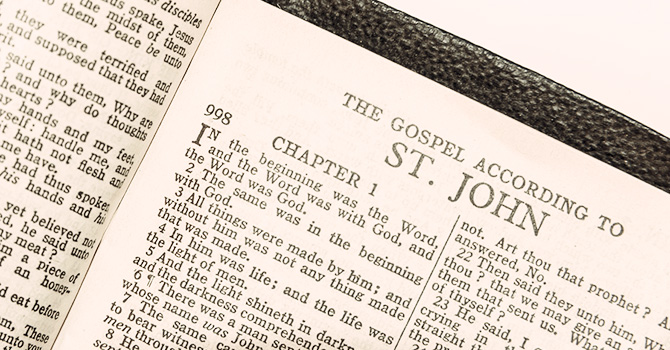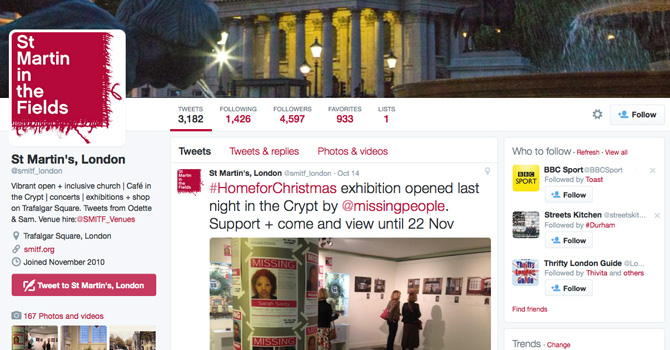Editor’s note: Faith & Leadership offers sermons that shed light on issues of Christian leadership. The following sermon was preached July 9, 2016, at Central Christian Church in Lebanon, Indiana, for the ordination service for Kyle Hunter.
Sisters at a loss. Jesus at a distance. Lazarus four days in the tomb. A tear and a prayer and a shout for a friend. Alive again! Burial cloths come off. Forty-five verses of an unforgettable story. And then what? What became of Lazarus?
Has this story ever left you wanting more? At least wondering if there was more?
We are told just a few verses down, at the beginning of chapter 12, that Lazarus was among those present when Jesus later came to his house for dinner. In fact, Lazarus attracted a lot of attention because he was living proof that Jesus could do amazing things and attract many followers. Some not only wanted to do away with Jesus; they wanted to kill Lazarus, too.
That’s the last reference to Lazarus in Scripture. Here’s a person who was dead -- four days dead -- and then alive again, and then, well, who knows? We hear nothing more about Lazarus as the action moves from his house in Bethany toward the events in Jerusalem. Nor do we receive any hints about Lazarus’ whereabouts or what he was doing once Jesus too was out of the tomb and alive again in the world.
Traditions and legends about our friend Lazarus abound, as the church has attempted to put some finishing touches on the story. He became a saint in the Catholic and Orthodox churches, though those two parts of the church don’t agree completely on the later events of Lazarus’ life. It’s believed he became a bishop in the early church. Some even believe they have found relics from Lazarus’ life.
One story claims that Lazarus remained so troubled by seeing all those unredeemed souls in Hades during the four days in the tomb that he smiled only one time in the 30 years that he lived after being raised by Jesus. One smile in 30 years. Raised from the dead and he smiled only one time. I’ve known people like that. They possess an uncanny ability to snatch defeat from the jaws of victory.
Fortunately, a more hopeful story can be found in Eugene O’Neill’s play “Lazarus Laughed.” The great title gives it away, doesn’t it?
“Lazarus laughed.”
I love that. I think it satisfies what I most want out of this story. Tell me, Lazarus, what was it like to come out of that tomb? What is it like to be alive again?
In that 1925 play, one of the cast members describes what happened when Lazarus emerged from the tomb: “Jesus looked into his face for what seemed a long time and suddenly Lazarus said ‘Yes’ as if he were answering a question in Jesus’ eyes.”
The crowd in the play asks, “Yes? What could he mean by yes?”
The description continues. Lazarus knelt and kissed Jesus’ feet. Both of them smiled. Jesus called Lazarus “my brother” and then went away.
And then it happened. Lazarus began to laugh, “softly like a man in love with God!”
The character doing most of the speaking at this point in the play says, “Such a laugh I never heard! It made my ears drunk! It was like wine!”
The crowd wants to know what it was like to be in that tomb. They want to know what it’s like to be dead and to be alive again. Lazarus is there among them, but at first, all he can say is “Yes!” And all he can do is laugh.
When he begins to elaborate a little more, he does so with “a strange unearthly calm in a voice that is like a loving whisper of hope and confidence.” Then he says some short lines that get repeated often in the play.
“Yes!”
“There is only life!”
“There is only laughter” -- “the laughter of God!”
In some places, the stage directions are as good as the actual dialogue. Listen to this: “He begins to laugh, softly at first -- a laugh so full of a complete acceptance of life, a profound assertion of joy in living, so devoid of all self-consciousness or fear, that it is like a great bird song triumphant in depths of sky, proud and powerful, infectious with love, casting on the listener an enthralling spell.”
And then it spreads. Lazarus laughs first, but then others begin laughing, too. The more Lazarus laughs, the younger and stronger he becomes. He laughs so much that his home in Bethany becomes known as the House of Laughter.
Now that is a story that never ends. The laughter of God breeds hope and confidence. It causes us to see things in a new light. Adventures begin with the laughter of God. Possibilities surface. The laughter of God changes things in our lives and in the church and in the world.
And we join in the laughter or we don’t. We consider whether we dare to risk laughter, whether we dare to immerse ourselves in its possibilities. We determine whether we sit on our creative ideas or get up and bless the community around us. We reveal by our very engagement whether the laughter of God reverberates in our lives or gets suppressed by caution, fear, dullness and indifference.
Kyle, we seek your help in keeping us close to that laughter. We are ordaining you today to be a priest in the House of Laughter. As much time as you will spend listening to and caring for the people of your congregation and community, spend at least that much time in the holy of holies, near to the heart of God, as the hymn says, so that you remain close enough to the laughter of God that it becomes the soundtrack of your ministry. And more than that, as a priest in the House of Laughter, it’s your job to report out, to emerge to tell us about the laughter of God and what it means for all of our lives and for the life of the world.
You should know that we will listen more closely to what you say about the laughter of God if we see and hear that laughter in your own life. So before we say another word about being ordained, before the mantle of pastor passes to you, before any pastoral or ecclesial responsibility falls on you, we want you to know the laughter of God first in your own life -- your personal life, your family life and your life of faith.
We all know there are times not to laugh -- somber occasions when the air is heavy with discernment and grief. We all know we do not laugh at the expense of others. We all know there are times when we can’t laugh -- sobering, tragic times like those in Orlando and Dallas, Paris and Istanbul. Laugh at times like that? No. Never.
But I’m fairly certain that you cannot walk with people helpfully and hopefully through the very worst moments of their lives unless you continue to hear in your own heart the laughter of God, regardless of what is going on around you.
Seeing and hearing the laughter of God in your own life, away from any thought of the church and apart from all things ministerial, will cause us to see, with little effort at all, that you are enjoying the life God has given you. That will be your first and most important witness.
But of course this service of ordination reminds us that there is more. We will look and listen for the laughter of God to characterize your ministry.
I have no doubt that people will speak of your deep compassion and your keen sense of justice. People will appreciate your pastoral presence and the genuine interest you take in them. They’ll give thanks for the way you bring the ancient truths of the Christian story to bear on contemporary questions and situations. But I’m hoping and believing that you will stay close enough to the laughter of God that your ministry becomes known for its profound joy and its powerful, calming, fear-removing laughter.
It’s like that F.A.O. Schwarz toy store on Chicago’s Magnificent Mile where I once stopped. What made the F.A.O. Schwarz experience unique was not the newest and shiniest toys, or the life-size stuffed animals, or the seemingly endless inventory that stretched from floor to ceiling everywhere you looked.
No, it was the laughter. You could hear it in every corner of the store, and it was coming from the staff -- young women and men who were having the time of their lives playing with the toys. And they were doing it on company time!
You are probably asking, shouldn’t those young people have been working? Shouldn’t they have been setting up displays or carefully describing the virtues of certain products or articulating a can’t-miss sales pitch? Isn’t that what the staff members are there for? How else will people know what toys to buy?
I’ll tell you how: follow the laughter.
Follow the laughter back to the corner of the store where two young women raced battery-operated helicopters between the main floor and the half-balcony overhead. Follow the laughter to another corner of the store where three other staffers played Mad Gab, giving hilarious clues to one another about common phrases. Follow the laughter to the front window where two staffers with hand puppets performed improv and laughed back and forth at each other’s impromptu creativity.
They were not only the best toy salespeople I have ever seen -- every customer bought something that day, including me -- but I also consider them among my mentors in ministry. I looked at how much fun they were having with those toys and thought to myself, this is what ministry is meant to be like.
Less talk and more joy. Less explanation and more playfulness. Less selling and promoting and more -- a lot more! -- embodying and expressing the sheer wonder and joy of our faith.
Congregations face many opportunities, challenges and ambiguities these days. Many congregations are given little chance by others and often have given up on themselves. Even some congregations that are thriving by outward appearances remain lifeless in stench-filled tombs behind daunting boulders. Of all the strategies for congregational transformation, none of them have a real chance until they are grounded in the laughter of God. Your work is to help your congregation listen for the laughter that calls them out into the light of day and into a new future full of life and joy.
The impact of laughter will be seen further in your ministry to the wider community. Listen with your congregation to the cries from far and near, cries for justice, peace and healing. We are ordaining you to a leadership of laughter that engages issues and solves problems in the wider community so that everyone can know the flourishing and safety and well-being that God intends for all of us.
I’ve become convinced that one of the things that brought down apartheid in South Africa was laughter. In those years of struggle, Archbishop Desmond Tutu didn’t walk into a room; he danced into it. There was no display intended.
He can’t help it. It’s the Spirit in him. And the Archbishop doesn’t laugh; he cackles. And when he does, it comes from some deep, playful place, as if he is cackling with the cackle of God.
I had the good fortune to be with a small group of colleagues at a breakfast in Cape Town a year ago at the Tutu Legacy Foundation. The archbishop had just been released after a two-week hospital stay. He had sent his regrets. But midway through the breakfast, we heard some strange noise in the entrance hallway.
Even while recovering from a rather serious illness, even as part of a fairly routine entrance, the archbishop led with laughter. And the more he laughed, the more we laughed. Even as he talked about the demanding challenges still facing his country, a transcendent laugh filled the room and permeated the conversation.
If the laughter of God is enough to get Lazarus out of a tomb and apartheid in one, then I think we all ought to give it a try. We all ought to listen for it, to allow it to form the word “Yes!” on our lips, to cause us to rise up as a mighty chorus to announce in the best and worst of situations, “There is only life!”
Kyle, you are being ordained at a remarkable time in the life of the church and the life of the world. An unleashing of creativity, experimentation and risk is underway. We are ordaining you to be another catalyst for this exciting season as new partnerships and untapped resources are channeled toward making a positive, life-giving impact.
Now more than ever, we want to call forth daring pastors who will stare down those opportunities and challenges and laugh them into something promising and real. We hope you, Kyle, will be one of those kinds of leaders.
We will watch and support you with prayerful interest and accompaniment as that infectious confidence takes deeper and deeper root, as those hopeful rebirths occur over and over again in your life, in your family’s life, in the congregation you serve and in this world God loves so much.
And when those things happen, people will be drawn to your ministry. Word will get out. We’ll no longer ask for the address of where you are serving or go to a website for information.
We’ll just follow the laughter.














